General Use: This document is for general use. Modification of content is prohibited unless you have Netwealth’s express prior written consent.
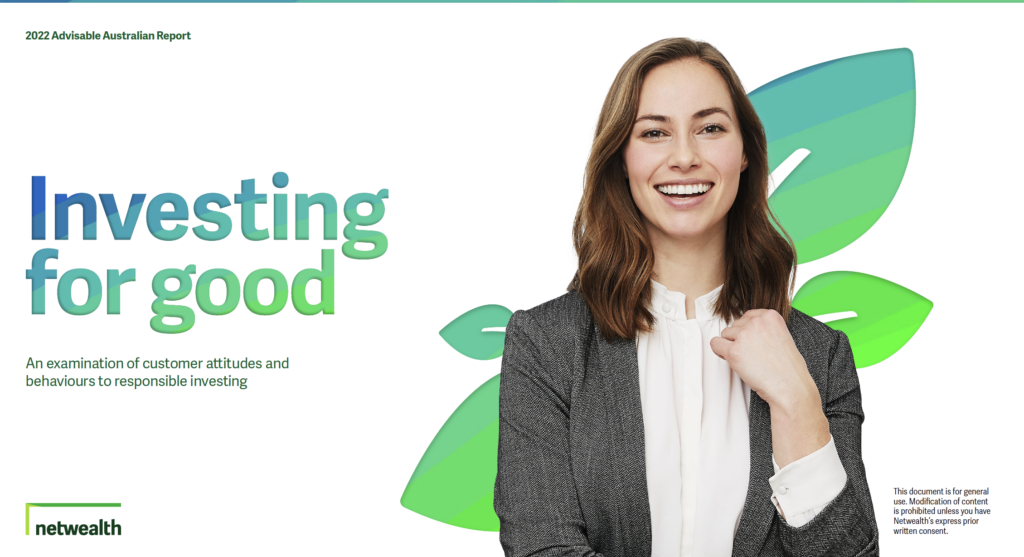
Takeaways
- Around two-thirds of Australians would consider responsible investments (RI)
- There are four main categories of responsible investors: Believers, Pragmatists, Doubters, and Sceptics. Each has different levels of expectations when it comes to investing responsibly
- By understanding these segments, advisers can tailor their advice and education offering
More and more, Australians are realising the role they play in influencing the environment, the community, and the world around them.
In Netwealth’s Investing for good white paper, based on its Advisable Australian research, it was found that more than half of Australians aged over 18 care deeply about environmental and social issues.
The report found that around a fifth (22%) — or more than four million people — already hold responsible investments, while a third (34%) expect to increase their allocation to responsible investing in the next five years.
With conversations around responsible investing therefore bound to come up more frequently, we developed four separate client segments to help advisers gain a deeper understanding of the needs of their clients in this area. They are:
- The Believer
- The Pragmatist
- The Doubter
- The Sceptic
Each of these categories or client segments has their own level of knowledge and receptiveness to responsible investing, which advisers should look to understand when having conversations and constructing portfolios for these clients.
The Believer
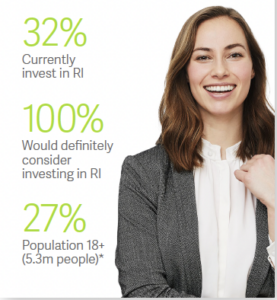
Help me do good.
Key features
- Youngest group, with an average age of 46, only 30% are Boomers and older, more likely to be female
- Care deeply about social and environmental issues, but only 32% currently invest responsibly due to lack of understanding and risk-averse attitude
- Higher than average household income of $149,341
They care about environmental and social issues but lack risk appetite to have done anything about it. Welcome to the world of the Believer, who needs help and education from their adviser as they work towards their responsible investing goals.
Despite their positivity — 83% care about environmental issues and 76% about social issues — only one-third (32%) of Believers have already engaged in responsible investing. This could be largely due to the fact around half of them rate their understanding of the subject as low or average.
Also holding them back is their risk appetite. When asked, 43% of Believers rate themselves as conversative or very conservative investors, while a further 33% say they are moderate investors looking for stable and reliable returns without risk.
How to advise a Believer
Advising this group requires lots of education and support in order to reach their do-good goals. On one hand, almost all of them (92%) believe the returns from responsible investments are as good as or better than returns from other investments. On the other, their risk-averse attitude means more than half (55%) of them want to invest in more commonly known and available investments, which is somewhat at odds with responsible investments that often fall into the new and innovative category.
When building a portfolio for Believers, be aware that doing good is more important than making money at all costs. Of Believers that have invested responsibly, the reasons they cite are having a positive social impact (55% of them), a positive environmental impact (55%) or humanitarian impact (47%). By contrast, around one quarter said they do it for the potential of higher growth compared to typical investments.
Therefore, when constructing portfolios for Believers, negative screening probably will not cut it, as Believers will probably want to make more of a difference, so investment options like positive screening and impact options will need to be considered.
The Pragmatist
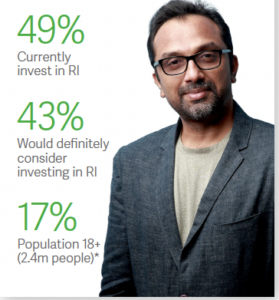
Show me the performance.
Key features
- Average age 51, equally male and female
- Household income averages $116,204
- While not actively seeking responsible investment, they are the group most likely to responsibly invest
- Strong understanding of financial topics and confidence in their abilities, more educated on responsible investments than most. Very focused on financial performance.
An advice conversation with a Pragmatist should always revolve around one thing: financial performance. Because while this group is confident in their investment capabilities, financially literate, and involved in responsible investing, the draw for them is as much about returns as it is about making a difference. They are more educated on the topic of responsible investment than average, with only 10% saying they have no understanding at all, and 40% claiming high understanding.
This is probably why around half (49%) of Pragmatists currently have responsible investments in their portfolios and 40% say they are likely to increase this in the future.
Yet, while they do deeply care about environmental issues (54%) and social issues (50%), they are also somewhat ambivalent when applying this to their portfolios. When asked if responsible investment is an important consideration, 93% said they were neither for nor against.
Advising a Pragmatist
Many Pragmatists believe in the financial rewards that responsible investing can deliver. Twenty-five per cent think it provides good or better returns compared to other investments, while 52% said it’s just as good.
Therefore, an adviser can focus on steering the conversation towards potential financial upsides. When meeting the preferences of a Pragmatist, focus needs to be on financial performance alone. While this does not immediately sound like responsible investing, care can be taken to avoid firms engaging in controversial or otherwise socially destructive activities, as the upside for such companies or industries might not have the long-term structural benefits.
Pragmatists will be looking for investments that benefit from tailwinds of structural change, like decarbonisation or more targeted investments like electric vehicles, where the perceived long-term increase in capital flows will drive future returns.
Conversations about tailwinds such as increasing consumer demand for environment products and services, improved government incentives and the increased acceptance that ESG favourable organisations can drive better returns will be worth having with these investors.
The Doubter
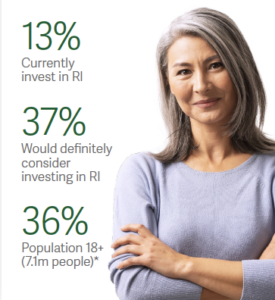
Convince me.
Key features
- Average age 51, more likely to be female than male
- Average household income of $112,543
- Only 13% currently have responsible investments, of those that don’t have them, 100% would consider
- Low understanding of responsible investing
For a Doubter, responsible investing is neither a thumbs up nor thumbs down. They don’t dismiss it completely, but they do need convincing.
With just over half of doubters caring deeply about environmental issues (57%) and social issues (47%), it’s hardly surprising that they are only mildly attracted to responsible investing. Only 13% hold responsible investments now, while just 29% expect their investment to increase in the next five years.
However, the Doubter is still worth talking to about responsible investing. In fact, part of their hesitancy might come down to lack of knowledge — only 21% rated their understanding of responsible investing as high, while 41% admitted theirs was low.
Most would possibly consider responsible investment if it made a quantifiable difference to society or the environment (92% and 87% respectively). And they do recognise the financial upside, with 78% agreeing that returns are as good or better than other investments.
How to advise a Doubter
Any attempt to introduce this on-the-fence group to responsible investing needs to be handled gently. Doubters need to be educated, but the environmental and social benefits alone are not enough — they need to also see strong financials, because 91% said they would consider responsible investing if they didn’t have to sacrifice returns.
A good place to start is to educate them on the topic broadly while also providing real world examples of responsible investments that are performing equally as well or better than the benchmark.
When building a portfolio, try to ensure financial performance is a priority and that credentials are supported by research. A negative screening approach from a well-credentialed fund manager might be the place to start.
With new Doubter clients, try not to focus too heavily on responsible investing initially, as this is not likely to resonate. Instead, gently introducing the concept while focusing on the financial benefits.
The Sceptic
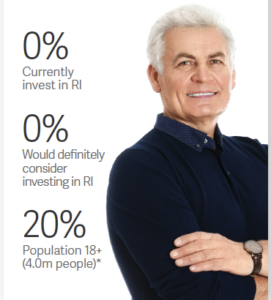
Don’t try to change me.
Key features
- Average age 59 and most are Boomers (49%) followed by Gen Y (21%), slightly more females than males
- Average household income of $75,272, most likely to be retired
- Unlikely to be convinced of responsible investors
Some people are unlikely to change their mind. Enter the Sceptic. They’re so set in their beliefs that it’s probably better to steer well clear of any talk about responsible investing.
Less than half (45%) say they are deeply concerned about the environment, and only 37% about social issues. None of them hold responsible investments, and none would consider it in the future.
This group also has a relatively low financial literacy in general, and two-thirds say they have no knowledge of responsible investing.
It’s wise to stay well clear of responsible investing when advising a Sceptic. You’re unlikely to change their mind.
These four categories of investors should provide advisers with a clear guide of how to build and structure their offering with socially responsible investing in mind. Preparing for this now is a wise move — its prevalence in the minds of clients will only become greater in the years to come.

